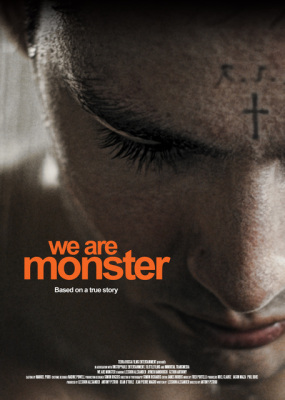We Are Monster

14 years ago in Feltham Young Offenders Institution in London, first-time felon Zahid Mubarek was murdered by his cellmate Robert Stewart, just hours before his release. Director Anthony Petrou takes his camera inside a cold prison set to depict this tragic and unprovoked attack to create We Are Monster; an examination of both a madman and the prison system that failed to contain him.
The film’s unusual title becomes abundantly clear from the offset, introducing Stewart (played committedly by Leeshon Alexander) as a long-suffering loner, who through exposure to childhood abuse and neglect has created a patronising racist teacher of an alter ego for guidance. Alexander’s bright and bold blue eyes dance over tranquil music to provide a haunting observation of a deranged chauvinistic thug, and fixed shots of the prison convey an apt and daunting sense of claustrophobia. But the interaction between Stewart’s alter egos becomes tiresome as the film wears on, creating a space of weary repetition and profanity, despite initial promising groundwork for a wholly powerful picture.
In attempting to be both an intimate portrait of a psychotic killer and a glaring expose of the incompetence of Britain’s penal system, We Are Monster trips over itself on numerous occasions, becoming clogged up amid a sea of saggy dialogue, which ranges from racist filth to unconvincing prison officer colloquy. Admirable in its ambitiousness and occasionally beautiful style, the film quite simply overreaches, succumbing to copious amounts of stilted dialogue that pounds the viewer over the head with its message.
Always most powerful and gripping in its quiet moments, even star Alexander is most engrossing during muted malevolent musings. Some superbly innovative shot selection and tactful cinematography set the tone for a careful and thought-provoking film, only for the ceaseless chatter to ultimately give it the subtlety of a ten-tonne sledgehammer.
Petrou must be credited with attempting to make a point that has elsewhere been avoided. Some inmates are monsters, some have simply made mistakes; and a system should exist separating those who admit to their failings and wish to be rehabilitated, and those who simply want to see the world burn. The film’s credits bemoan the lack of justice in the aftermath of Mubarek’s murder, and it remains unfortunate that We Are Monster’s dragging dialogue softens the punch needed to turn numerous heads towards a troubling issue.
Gareth Lloyd
We Are Monster is screened on 20th June 2014 as part of Edinburgh Film Festival. For further information or to watch the trailer visit the festival’s website here.
























Facebook
Twitter
Instagram
YouTube
RSS